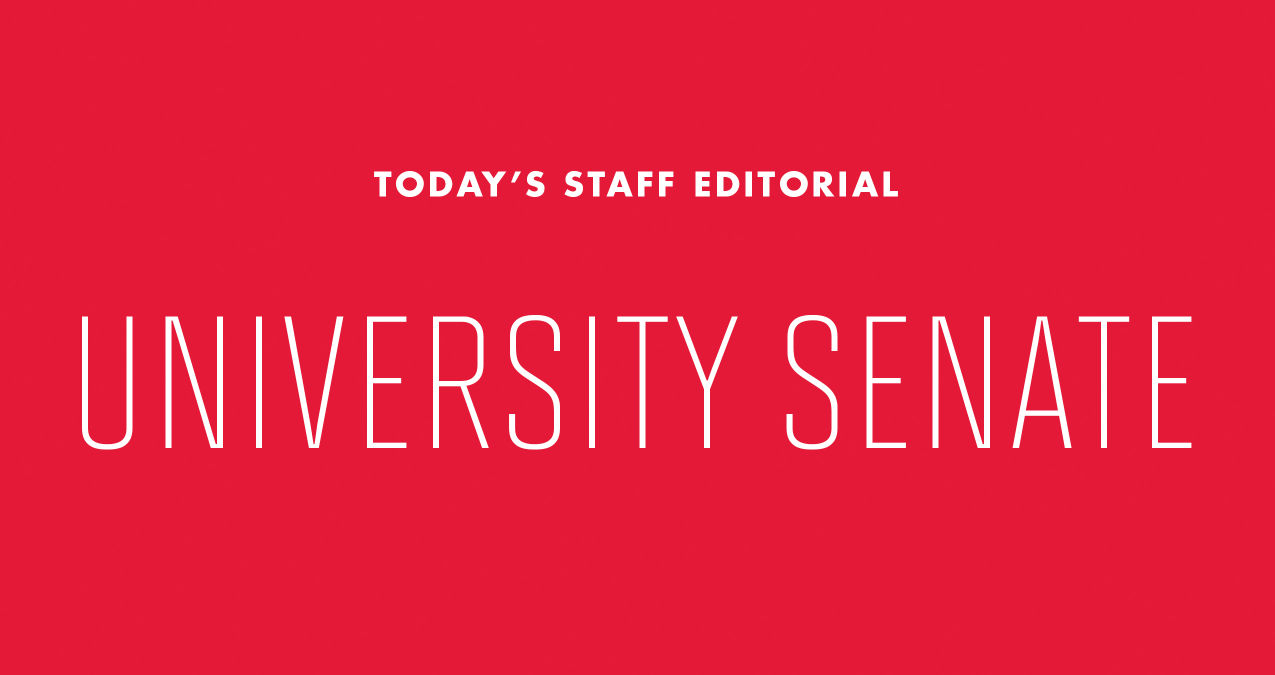
University Senate (graphic)
If you ask them, this university’s legislative body members don’t want to get too political.
It’s a puzzling sentiment, especially coming from the same organization that proclaims itself “the loudest voice on campus” in its promotional brochure — a representational voice, one would think.
Regardless, the University Senate, composed of peer-elected faculty, staff and students, has suggested that recording and storing the voting records of its members would overtly politicize what boils down to a voluntary advisory role to university President Wallace Loh.
In theory, sure, one could argue that approving budgets, disciplinary rules, academic policies and strategic plan updates merely recommends these legislative items for Loh’s approval — notwithstanding the fact that, barring the salary or stipend, senators are doing work virtually indistinguishable from that of your local city councilor.
But consider that over Loh’s five academic years at the university’s helm, the president has yet to veto a bill that made its way to his desk, and the line between advisory body and unchecked majority begins to blur.
It’s not as though the Senate’s approved proposals have been met with universal acclaim, either. A rework of the university’s sexual misconduct policy came under fire for the better part of the 2014-15 school year from both victims’ rights advocates and legal hounds, while a tobacco ban the year prior drew ire from smokers across the campus.
Ongoing alterations to the university’s tenure and tenure-track designations, as well as other faculty and instructor roles, have been met with dissatisfaction from those on the university payroll, some of whom have stated that the changes don’t go far enough in addressing inequity.
The list goes on, but the senate’s potential for — and record of — approving the sort of unsatisfying compromises inherent to secular government suggests it is, in fact, far more representative of a governmental body than just a 190-strong group of academic types playing at politics.
If faculty, staff and students elect senators to represent them with the understanding that the senators will represent their interests in front of university policymakers and administrators, it follows logically that senators should be held accountable through public voting records.
If such a measure manages to professionalize or politicize the senate, it comes as merely an added bonus.
After all, students are largely indifferent when it comes to voting in any campus election, and if discovering just how their peers voted on matters that affect them leads to a greater perceived stake in senate goings-on, it fosters the sort of political engagement this university holds so dear. If they still don’t care — well, then the senate’s fears of tarnishing the sanctity of their campaignless, impossibly polite elections were for naught.
Assigning identifiable clickers to each senator and recording his or her votes throughout the academic year shouldn’t prove an insurmountable challenge. If it does, pens, paper, checkboxes and signatures would suffice as a more or less cost-free alternative.
The Senate might well constitute the campus’s loudest voice, but without public voting records for each senator, it also makes up one of its most anonymous and least accountable. We fight for transparency within our federal and state governments’ professional politicians — we shouldn’t have to fight for it from our peers as well.



